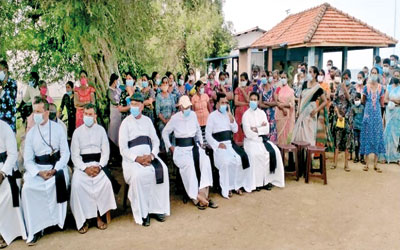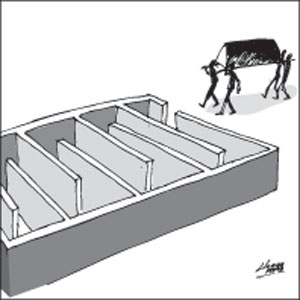News
Iranaitivu, where the war displaced began new lives, is no place for COVID graves
Since the Government’s Tuesday announcement that a two square kilometre Iranaitivu islet located off the Mannar coast has been selected as a site to bury COVID-19 victims, the island’s fisherfolk community have been staging a protest demanding that the decision be revoked.
Even the local authorities came to know about the decision after the Cabinet news conference on Tuesday.

Since Tuesday Iranaitivu's fisherfolk community have been staging a protest against the COVID-19 burials on the islet Pix by Romesh Madushanka
Located some twenty kilometres from the coastal area of Mulankavil in Kilinochchi, the islet was the home for 417 families before the wartime displacement in 1992.
Iranaitivu comes under the administrative purview of the Pooneryn Divisional Secretariat of the Kilinochchi district. An official said the divisional secretariat was not consulted or informed about the decision to use the island as a burial site.
According to data at Pooneryn Divisional Secretariat, 412 people from 111 families now live on the island and engage in fishing as the main source of their livelihood.
Since the end of the war, the island had been under the control of the Navy. But in 2018, the displaced residents in what was seen as the peak of their continuous protests took sea passage in fifty boats to reclaim their land on the island. The Navy did not object to the arrival of about one hundred of the 400 families that had lived on the island. Most of the others have relocated at Iranaimatha Nagar in the mainland after the end of the war.
Soon the returnees took to their traditional livelihood of fishing and agriculture.
This week, when graves were being dug in Iranaitivu, the residents protested, claiming that the burial of COVID-19 victims would affect their livelihood.
Parish priest Rev. Fr. M. Paththinathar told the Sunday Times that the island’s people would not allow the burial of COVID-19 victims on the island at any cost.
“The island has about 138 sea cucumber harvesting farms. Their products are for the export market. The decision to use our island as a burial site would be harmful to our community,” he said.
 The priest said the villagers expressed solidarity with the Muslims and understood their agony they were going through due the Government’s earlier policy of not allowing the burial of COVID-19 victims. But they asked why the government selected their islet as a burial site though many potential burial sites elsewhere had been proposed.
The priest said the villagers expressed solidarity with the Muslims and understood their agony they were going through due the Government’s earlier policy of not allowing the burial of COVID-19 victims. But they asked why the government selected their islet as a burial site though many potential burial sites elsewhere had been proposed.
The issue was raised at the Kilinochchi District Coordination Committee (DCC) meeting on Friday and a unanimous decision was taken to urge the Government to look for alternate burial sites as Iranaitivu was not the suitable place for burials.
Fisheries Minister Douglas Devananda, who was the Co-Chair of the DDC Committee, pointed out that the decision to use the island as burial ground would be detrimental to the local fisherfolk community since they depended on the ground water for farming and drinking purposes.
Recently the Fisheries Ministry launched a US$25,000 sea cucumber project on the island with a view to giving the islanders and economic boost.
On Friday, the Navy blocked journalists who wanted to take the boat ride to the islet from the mainland at Iranaimatha Nagar.
The Navy, which maintains a Navy camp in Iranaitivu and is responsible for the islet’s security, said only residents would be allowed to take the boat rides between the islet and the mainland. Outsiders, including media personnel, would not be allowed.
Navy Media Spokesperson Indika de Silva told the Sunday Times the directive was issued by Navy Headquarters in Colombo, citing COVID-19 regulations and the travel restriction would continue until further notice.
On Friday, the Government announced that it had made arrangements to bury COVID-19 victims at a burial site in Oddamavadi in the Batticaloa district.


